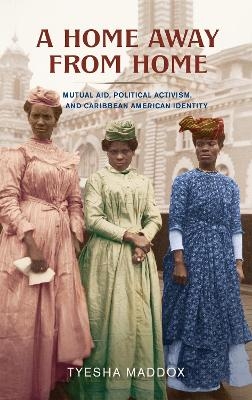
A Home Away from Home
Mutual Aid, Political Activism, and Caribbean American Identity
Seiten
2024
University of Pennsylvania Press (Verlag)
978-1-5128-2454-4 (ISBN)
University of Pennsylvania Press (Verlag)
978-1-5128-2454-4 (ISBN)
A Home Away from Home examines the significance of Caribbean American mutual aid societies and benevolent associations to the immigrant experience, particularly their implications for the formation of a Pan-Caribbean American identity and Black diasporic politics.
At the turn of the twentieth century, New York City exploded with the establishment of mutual aid societies and benevolent associations. Caribbean immigrants, especially women, eager to find their place in a bustling new world, created these organizations, including the West Indian Benevolent Association of New York City, founded in 1884. They served as forums for discussions on Caribbean American affairs, hosted cultural activities, and provided newly arrived immigrants with various forms of support, including job and housing assistance, rotating lines of credit, help in the naturalization process, and its most popular function—sickness and burial assistance. In examining the number of these organizations, their membership, and the functions they served, Tyesha Maddox argues that mutual aid societies not only fostered a collective West Indian ethnic identity among immigrants from specific islands, but also strengthened kinship networks with those back home in the Caribbean. Especially important to these processes were Caribbean women such as Elizabeth Hendrickson, co-founder of the American West Indian Ladies’ Aid Society in 1915 and the Harlem Tenants’ League in 1928.
Immigrant involvement in mutual aid societies also strengthened the belief that their own fate was closely intertwined with the social, economic, and political welfare of the Black international community. A Home Away from Home demonstrates how Caribbean American mutual aid societies and benevolent associations in many ways became proto-Pan-Africanist organizations.
At the turn of the twentieth century, New York City exploded with the establishment of mutual aid societies and benevolent associations. Caribbean immigrants, especially women, eager to find their place in a bustling new world, created these organizations, including the West Indian Benevolent Association of New York City, founded in 1884. They served as forums for discussions on Caribbean American affairs, hosted cultural activities, and provided newly arrived immigrants with various forms of support, including job and housing assistance, rotating lines of credit, help in the naturalization process, and its most popular function—sickness and burial assistance. In examining the number of these organizations, their membership, and the functions they served, Tyesha Maddox argues that mutual aid societies not only fostered a collective West Indian ethnic identity among immigrants from specific islands, but also strengthened kinship networks with those back home in the Caribbean. Especially important to these processes were Caribbean women such as Elizabeth Hendrickson, co-founder of the American West Indian Ladies’ Aid Society in 1915 and the Harlem Tenants’ League in 1928.
Immigrant involvement in mutual aid societies also strengthened the belief that their own fate was closely intertwined with the social, economic, and political welfare of the Black international community. A Home Away from Home demonstrates how Caribbean American mutual aid societies and benevolent associations in many ways became proto-Pan-Africanist organizations.
Tyesha Maddox is Assistant Professor of African and African American Studies at Fordham University.
Introduction
Chapter 1. Friendly Societies in the Caribbean and Their African Traditions
Chapter 2. Whence They Came: Immigration and Mobility in the Caribbean
Chapter 3. More Than Auxiliary: The Functions of Mutual Aid Societies and Benevolent Associations
Chapter 4. Gendering the Migrant Experience: Caribbean Women’s Roles in Social Organizations and Transnational Community Development
Chapter 5. Community Building and Political Mobilization: Forging a Caribbean and Black Identity
Conclusion
Notes
Bibliography
Index
Acknowledgments
| Erscheinungsdatum | 17.01.2024 |
|---|---|
| Zusatzinfo | 4 b/w photos, 5 charts, 1 table |
| Verlagsort | Pennsylvania |
| Sprache | englisch |
| Maße | 152 x 229 mm |
| Themenwelt | Geisteswissenschaften ► Geschichte ► Regional- / Ländergeschichte |
| Sozialwissenschaften ► Ethnologie | |
| Sozialwissenschaften ► Soziologie | |
| ISBN-10 | 1-5128-2454-2 / 1512824542 |
| ISBN-13 | 978-1-5128-2454-4 / 9781512824544 |
| Zustand | Neuware |
| Haben Sie eine Frage zum Produkt? |
Mehr entdecken
aus dem Bereich
aus dem Bereich
Universalgelehrter, Polarreisender, Entdecker
Buch | Hardcover (2024)
mareverlag
28,00 €


